Key takeaways:
- Ethical brands prioritize sustainability, fair labor practices, and transparency, significantly impacting consumer choices and market trends.
- Choosing ethical fashion promotes environmental responsibility and supports fair treatment of workers, fostering a sense of personal fulfillment.
- Key criteria for selecting ethical brands include transparency in supply chains, environmental impact, and community involvement.
- Brands like Everlane, Patagonia, and Nudie Jeans exemplify ethical practices, offering products that align with consumers’ values and contribute to a circular economy.
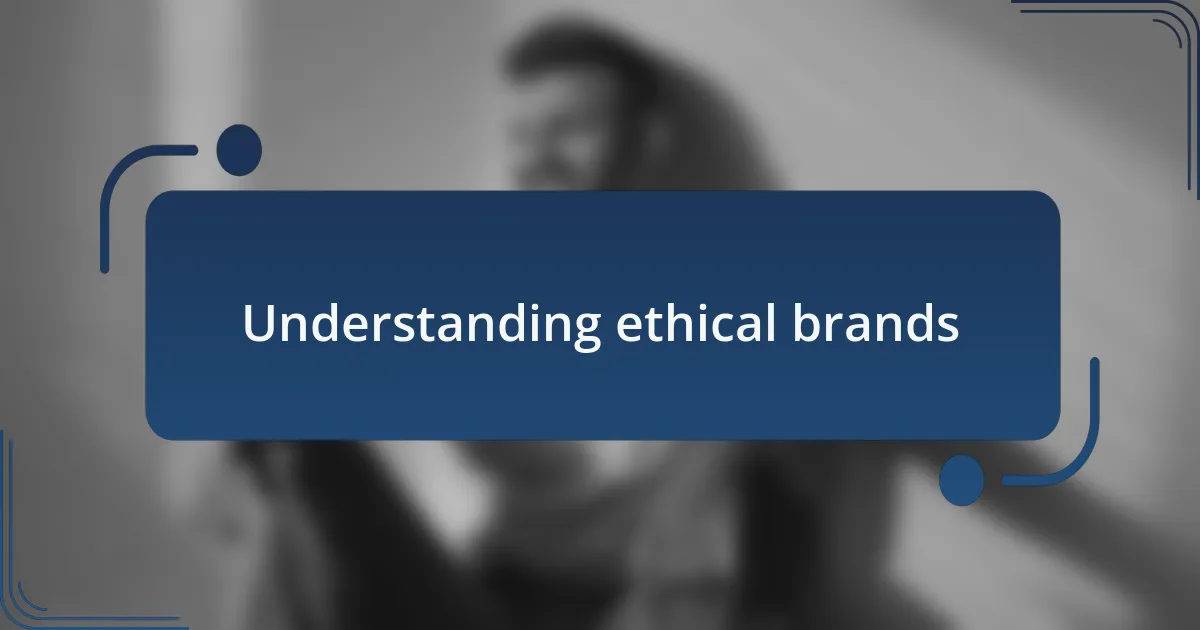
Understanding ethical brands
Ethical brands are those that prioritize sustainability, fair labor practices, and environmental responsibility in their production processes. I remember the first time I chose a pair of jeans from a brand that highlighted its commitment to ethical sourcing; it felt like I was making a small yet significant choice that aligned with my values. Doesn’t it feel great to wear something that not only looks good but also does good?
When I think about ethical brands, I often wonder how much the story behind each garment impacts our day-to-day lives. For instance, brands that transparently share their production methods often resonate deeper with me. It’s about understanding the journey of my jeans, knowing that they were made with care and respect for the people involved in their creation.
Each time I find a collection that promotes eco-friendly materials, I feel a spark of hope. It strikes me how small changes in our purchasing habits can contribute to a larger movement towards sustainability. Isn’t it empowering to realize that our choices can influence market trends? Choosing ethical fashion isn’t just a trend; it’s a step towards a more responsible consumption culture.
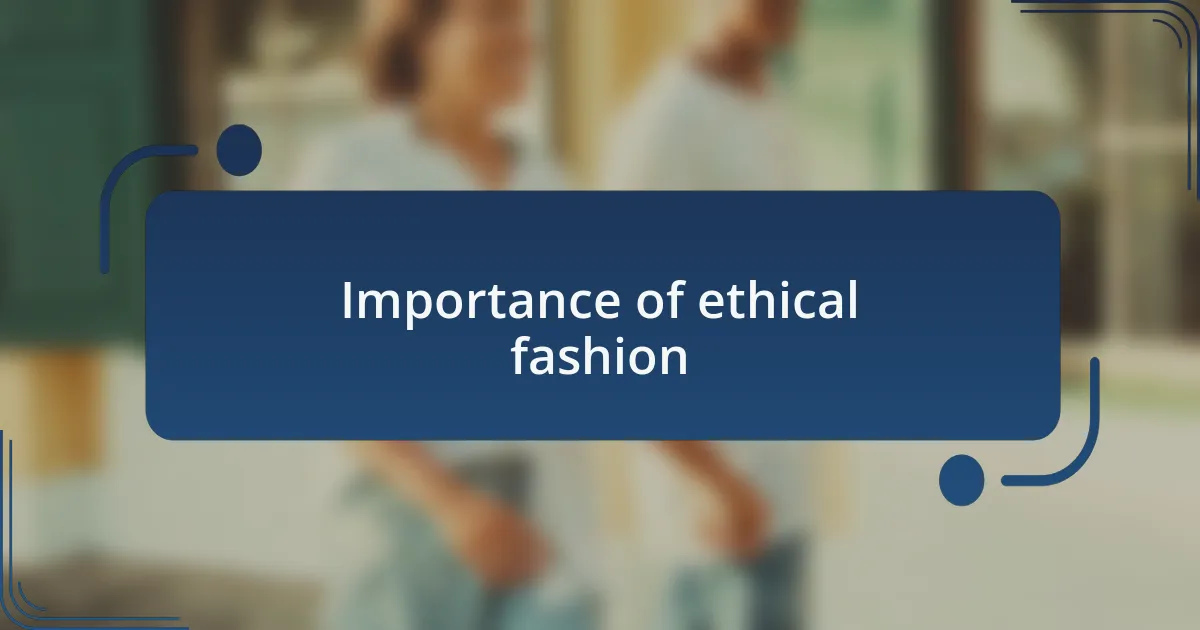
Importance of ethical fashion
Ethical fashion is crucial not only for environmental sustainability but also for ensuring fair treatment of workers involved in the production process. I vividly remember the day I uncovered the practices behind a favorite jeans brand and learned about their commitment to treating workers fairly. It instantly made me appreciate my purchase on another level—knowing that my choice had a positive impact on someone else’s life felt rewarding.
There’s something profoundly transformative about investing in ethical brands. When I discovered a local company that used recycled materials in their denim production, it ignited a passion in me to support businesses that prioritize the planet. I often ask myself, “How can I contribute to a healthier environment?” The answer lies in my shopping choices, showing me that each decision I make can create ripples of change that extend far beyond my wardrobe.
Moreover, ethical fashion encourages transparency in the industry; it challenges brands to be honest about their practices. I once stopped buying from a popular jeans label after I learned about their shady sourcing practices. It’s moments like these that remind me how powerful consumer demand can be. By prioritizing ethical fashion, I am not just making a style choice; I’m actively participating in a movement calling for more accountability in the fashion industry.
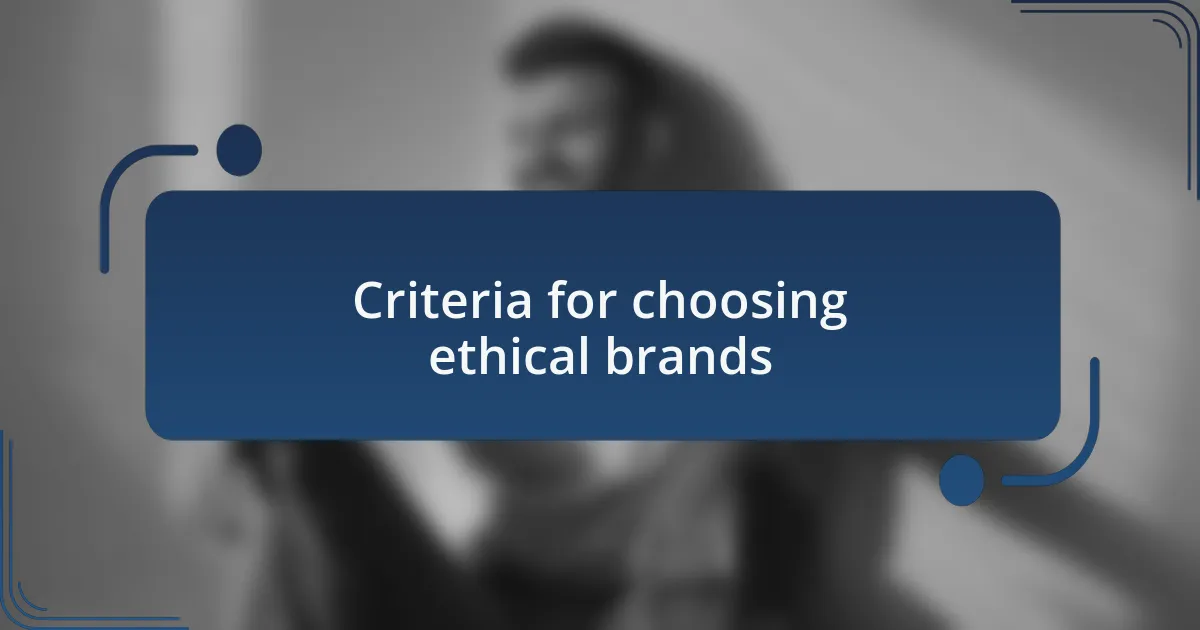
Criteria for choosing ethical brands
When I evaluate ethical brands, I always start with their transparency. It really strikes me when a company openly shares their supply chain details, from where the materials are sourced to the conditions workers endure. I remember discovering a brand that highlighted its partnerships with fair-trade factories; knowing that they prioritize accountability made me much more willing to invest in their products.
Another significant criterion is environmental impact. I’ve often been swayed by brands that actively promote sustainable practices, like using organic cotton or incorporating recycled materials into their jeans. For me, when I see a brand commit to reducing waste and pollution, I can’t help but feel inspired to support their efforts. It feels empowering to know that my choices contribute to a healthier planet, doesn’t it?
Lastly, I look for community involvement. A brand that gives back to its community resonates with me on a deeper level. I remember when I came across a jeans brand that donated a portion of its profits to local environmental initiatives. It made me feel part of something bigger, like my purchase was not just a transaction but a step toward positive change in the world around me. Wouldn’t you want your shopping habits to support causes you care about?
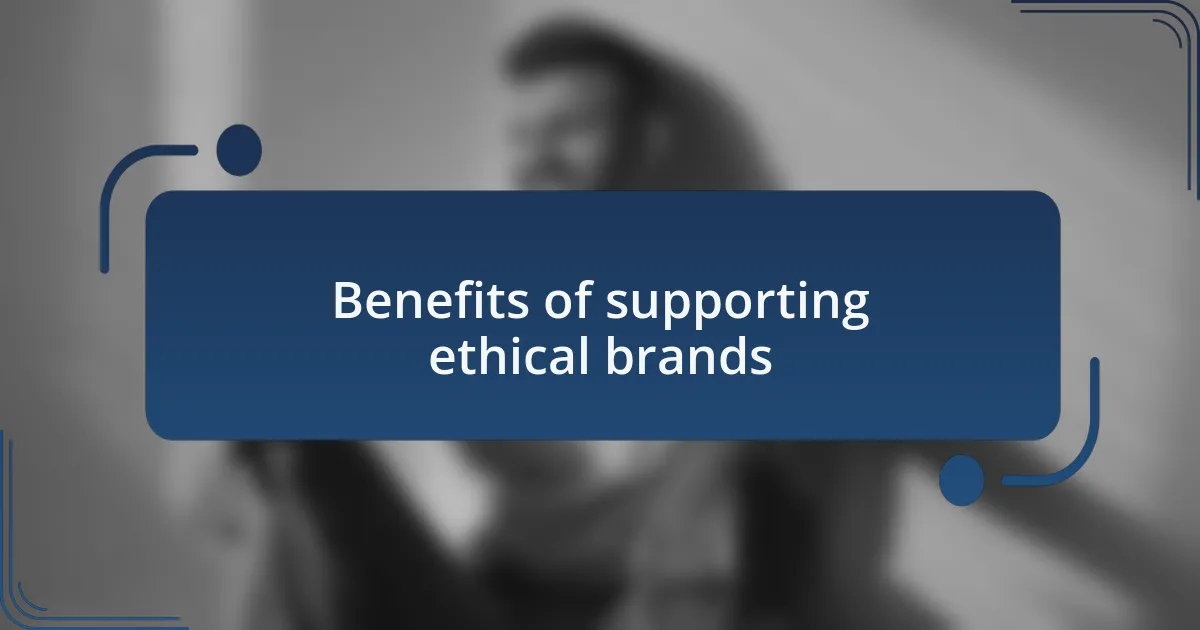
Benefits of supporting ethical brands
Supporting ethical brands offers a sense of personal fulfillment that I find incredibly rewarding. I still remember the rush of excitement I felt when I wore a pair of jeans I knew were made under fair labor conditions. Each time I slip them on, it’s not just about fashion; it’s a reminder that my choices align with my values.
Moreover, there’s the ripple effect of community support that I deeply appreciate. When I purchase from brands that reinvest in local communities, I feel like I’m contributing to a larger cause. I once bought a pair of jeans from a company that funded after-school programs for underserved youth. Knowing that my purchase helped create opportunities for others made me feel connected, almost like I was part of their journey.
Finally, I notice how ethical brands often foster innovation and quality in their products. I’ve experienced the difference firsthand—jeans made from sustainable materials tend to have a unique durability and fit that fast fashion simply can’t match. Isn’t it fascinating how making responsible choices can lead to products that not only feel good but also stand the test of time?
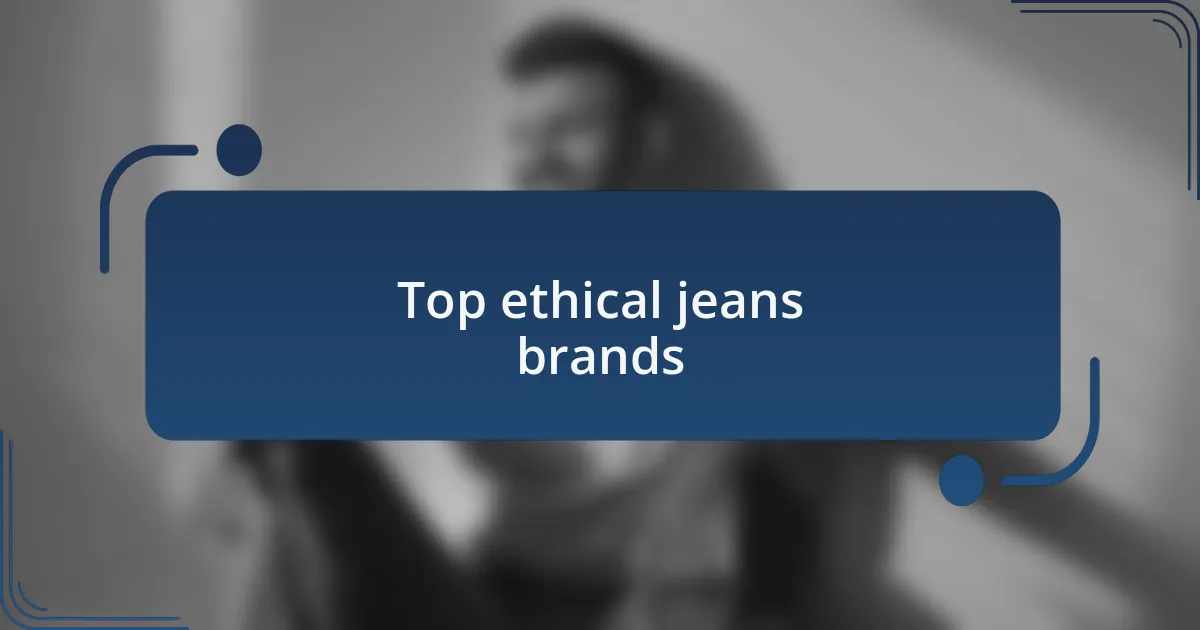
Top ethical jeans brands
When it comes to ethical jeans brands, one that immediately stands out to me is Everlane. Their commitment to transparent pricing and sustainable practices resonates deeply with my values. I can recall purchasing a pair of their jeans, and the sense of satisfaction I felt knowing exactly where my money went and how the product was made was quite empowering.
Another brand I’ve come to admire is Patagonia. They not only produce high-quality jeans but are also champions of environmental causes. I will never forget the day I wore their jeans on a hike, feeling connected to nature and proud that my fashion choice supported eco-friendly practices. Their sustainability efforts make me reflect on how I can contribute to preserving the environment through the brands I support.
Nudie Jeans has also earned a special place in my wardrobe. Their focus on organic cotton and their commitment to repair services align perfectly with my belief that clothing should be made to last. I remember the first time I visited one of their stores, I was struck by their dedication to minimizing waste and extending the life of jeans—an ethos I wholeheartedly support. How often can you say your clothing purchase contributes to a circular economy?
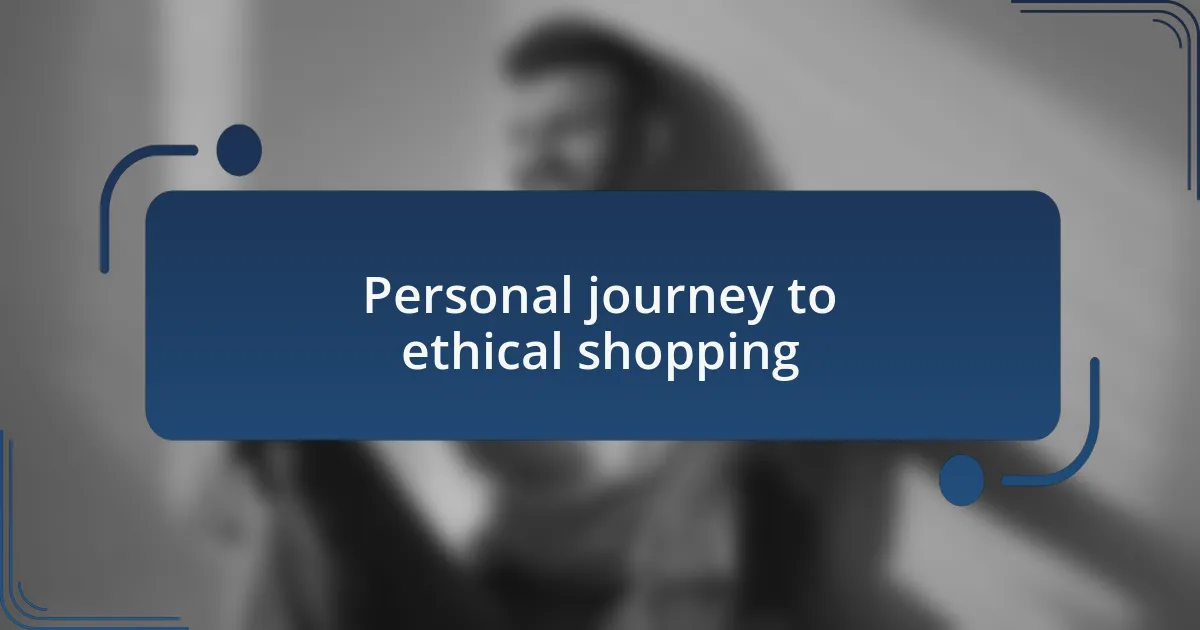
Personal journey to ethical shopping
While my journey into ethical shopping began with research, I quickly realized the profound impact it had on my understanding of fashion. I still vividly recall the moment I stumbled upon a small, local brand that used recycled materials. I had just bought a pair of their jeans, and as I slipped them on, a wave of pride washed over me. It felt like I was making a statement—not just about my taste in style, but also about my commitment to the planet. How could fashion feel so rewarding?
Exploring the ethical fashion landscape has been a transformative experience for me. I remember one evening, sitting with friends wearing my ethically sourced jeans, and we shared our thoughts on sustainability. It was enlightening to discuss how conscious choices in our wardrobe could ripple out to create change in the broader industry. Each time I wear those jeans, I’m reminded that fashion can be both stylish and responsible. Isn’t it exciting to think that what we wear aligns with our values?
Through this journey, I’ve learned that shopping ethically goes beyond just purchasing decisions; it’s about cultivating a mindset. On a recent trip, I chose to leave behind a trendy, fast-fashion store in favor of a nearby ethical shop. As I discovered brands that prioritized fair labor and sustainable practices, I felt a sense of fulfillment. I found myself thinking—what legacy do I wish to leave for future generations when it comes to my clothing choices? It’s not just about jeans; it’s about creating a future that reflects our values.